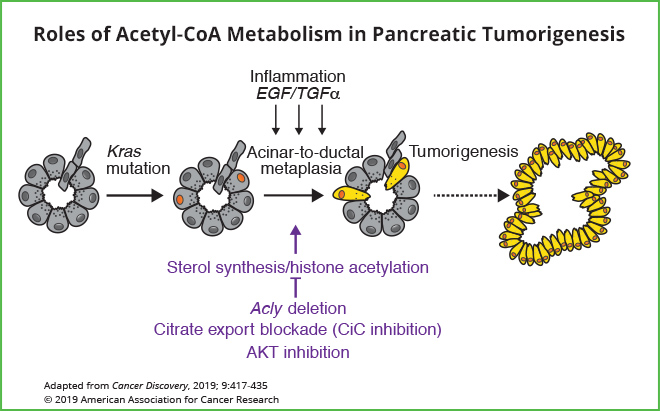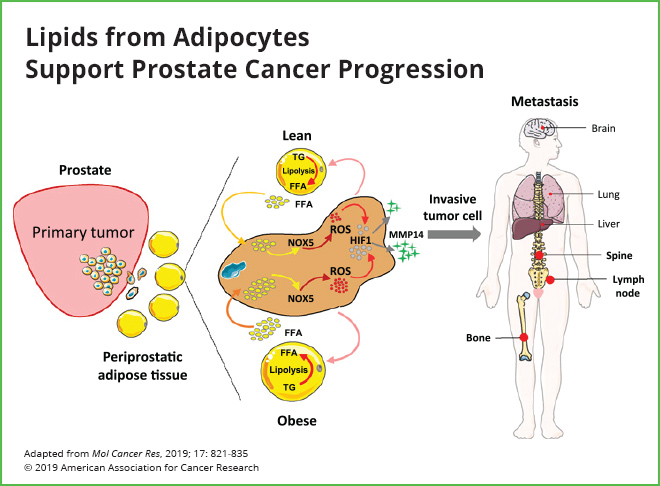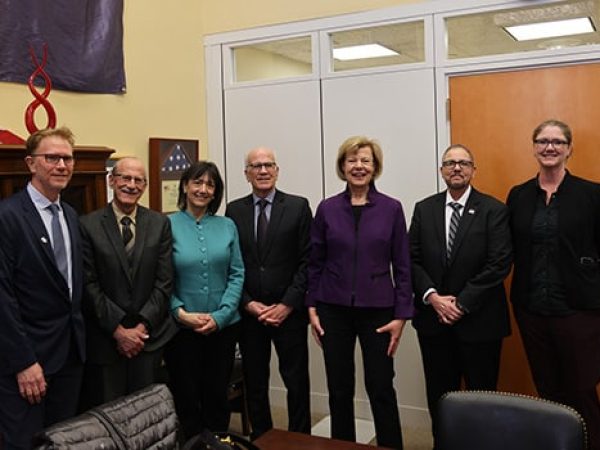March Editors’ Picks from AACR Journals
Back for March are the editors’ picks from the portfolio of scientific journals published by the American Association for Cancer Research (AACR). This month, articles include results from two clinical trials, two preclinical pancreatic cancer studies, and more. As always, articles summarized here are freely available for a limited time.
Journal: Cancer Discovery
Acetyl-CoA Metabolism Supports Multistep Pancreatic Tumorigenesis
Previous work has found that histone acetylation, which is regulated by availability of the key metabolite acetyl-CoA, promotes the development and progression of pancreatic tumors, offering possibilities for therapeutic intervention in this hard-to-treat cancer. In this study, the researchers found that pancreatic acinar cells harboring mutations in the KRAS gene had high levels of acetyl-CoA, which facilitates acinar-to-ductal metaplasia and can lead to tumorigenesis. Additionally, they highlight that that pancreas-specific loss of ATP-citrate lyase (ACLY), an enzyme that produces acetyl-CoA, decreased histone acetylation in acinar cells and suppressed tumor formation in mice models. Accordingly, the specific targeting of acetyl-CoA-dependent pathways suppressed tumor growth in preclinical models, highlighting a potential therapeutic strategy for KRAS-driven pancreatic cancer.
Journal: Clinical Cancer Research (March 15 issue)
The international ECHELON-1 phase III clinical trial found that the combination of brentuximab vedotin (an antibody-drug conjugate that targets CD30) plus chemotherapy (doxorubicin, vinblastine, and dacarbazine; AVD) was superior to the standard-of-care treatment (the antineoplastic antibiotic bleomycin plus AVD) as first-line treatment for patients with stage 3 or 4 classical Hodgkin lymphoma. This study reports on the safety, efficacy, and disease management for the subgroup of patients in the ECHELON-1 trial treated in North America. While the brentuximab vedotin and AVD combination demonstrated an improvement in the modified progression-free survival (defined as progression, death, or the receipt of additional treatment for subjects not achieving a complete response) in the overall analysis (HR = 0.77), the results were even more pronounced in the North American cohort (HR = 0.60). Grade 3 or 4 adverse events were more common in the brentixumab vedotin plus AVD arm, yet fewer patients in this arm discontinued treatment due to AEs. The authors conclude that the findings from this subgroup support brentixumab vedotin plus AVD as a frontline treatment option for patients with advanced Hodgkin lymphoma.
Journal: Cancer Research (March 1 issue)
Frizzled-7 Is Required for Wnt Signaling in Gastric Tumors With and Without Apc Mutations
Mutations to certain genes that affect the binding of Wnt to its receptors in the Frizzled (Fzd) protein family are observed in a subset of gastric tumors, and increased Fzd expression is associated with poor clinical outcome; however, targeting Fzd for the treatment of gastric cancer remains unstudied. Here, the authors found that Frizzled-7 (Fzd7) was the predominant mediator of oncogenic Wnt signaling in both human gastric cancer cells and in murine models. Genetic deletion of Fzd7 or pharmacological targeting of Wnt/Fzd inhibited the growth of gastric adenomas regardless of Apc mutational status in preclinical models. These results suggest that targeting the Wnt/Fzd7 axis may have therapeutic benefit for patients with gastric cancer.
Journal: Molecular Cancer Research
The spreading of prostate cancer into the periprostatic adipose tissue (PPAT), a fat deposit that surrounds the prostate gland, is an adverse prognostic factor for the disease that is amplified in obesity. In this study, the authors found that prostate cancer cells can increase adipocyte lipolysis, and that the released free fatty acids (FFA) are incorporated into the tumor cells. These FFAs stimulate the expression of NOX5, inducing oxidative stress and increasing the invasion of prostate cancer cells, which was amplified by obesity in preclinical experiments. These results elucidate an underlying role for PPAT in prostate cancer aggressiveness, and suggest that inhibition of NOX5 may represent a potential treatment strategy for locally invasive prostate cancer, particularly for patients who are obese.
Journal: Clinical Cancer Research (March 1 issue)
Preclinical investigation has revealed that inhibition of the AKT kinase can combat resistance to platinum-based therapy. In this clinical trial, researchers assessed the combination of the pan-AKT kinase inhibitor afuresertib with paclitaxel and carboplatin in patients with recurrent platinum-resistant epithelial ovarian cancer and primary platinum-refractory ovarian cancer; Part I (29 patients) was a dose-escalation study, while Part II (30 patients) was a single-arm evaluation of the combinatorial treatment regimen. The maximum tolerated dose of afuresertib in this setting was determined to be 125mg/day, and all patients reported at least one adverse event (AE) in both parts of the trial, with 76 percent of patients reporting grade 3-4 AEs. The overall response rate as determined by RECISTv1.1 was 32 percent, with a progression-free survival of 7.1 months. As patients with platinum resistance have historically shown a response rate of less than 15 percent when re-exposed to platinum-containing regimens, the authors conclude that this combinatorial treatment warrants further clinical evaluation.
Journal: Cancer Research (March 15 issue)
Mitochondrial microRNAs (mitomiRs) are small non-coding RNA molecules that translocate from the nucleus to the mitochondria; how these molecules affect mitochondrial transcription remains unknown. Here, the authors demonstrate that mitomiR-2392 can partially inhibit mitochondrial transcription and can reprogram metabolic pathways in tongue squamous cell carcinoma (TSCC) cells, thereby regulating their cisplatin resistance. Additionally, a retrospective analysis of TSCC patient samples revealed that low mitomiR-2392 expression was associated with chemosensitivity and favorable patient prognosis. These results suggest that mitomiRs can trigger chemoresistance in TSCC through the regulation of mitochondrial transcription, and that mitomiR-2392 could be utilized as a predictive biomarker for chemosensitivity and overall survival.
Journal: Cancer Prevention Research
The chemopreventive molecule benzyl isothiocyanate (BITC), derived from components of cruciferous vegetables, has been previously shown to inhibit breast cancer stem-like cells (bCSC) in transgenic mice, yet the underlying mechanism for this phenomenon remains unknown. In this study, the authors found that BITC treatment of breast cancer cells increased the expression of the zinc-finger transcription factor Krüppel-like factor 4 (KLF4). An analysis of RNA-Seq data from The Cancer Genome Atlas revealed a significant positive correlation in the expression of the KLF4 and p21CIP1 genes in breast cancer, and the knockdown of these two proteins augmented BITC-mediated suppression of bCSC. These results suggest that the supplementation of BITC with an inhibitor of KLF4 as a method for breast cancer chemoprevention may warrant further study.
Journal: Cancer Immunology Research
Despite the immunogenicity of colon tumors, the majority of colon cancers do not respond to immune checkpoint blockade. In this study, the authors investigated the mechanism underlying the inactivity of tumor-infiltrating cytotoxic T-cell lymphocytes (CTLs) in colon tumors. They found that histone methyltransferase SUV39H1 expression was significantly elevated in human colon carcinoma compared with normal tissues, and that tumor-infiltrating CTLs in a mouse colon carcinoma model had high expression of SUV39H1. After conducting a virtual chemical library screen, the authors synthesized a small molecule inhibitor of SUV39H1, which inhibited histone methylation, leading to the increased expression of key effectors in tumor-infiltrating CTLs and suppressing colon carcinoma growth in mice. These results suggest that inhibiting SUV39H1 can enhance effector gene expression in tumor-infiltrating CTLs, leading to the suppression of colon carcinoma growth.
Journal: Molecular Cancer Therapeutics
TGFβ Blockade Augments PD-1 Inhibition to Promote T-cell-mediated Regression of Pancreatic Cancer
Because malignant pancreatic tumors are often non-immunogenic, most patients do not derive long-term benefit from treatment with immunotherapies. Transforming growth factor beta (TGFβ) has been identified as a repressor of anti-tumor immunity in pancreatic cancer, yet its overall contributions to carcinogenesis remain unexplored; this study aimed to understand why the pharmacologic inhibition of TGFβ has shown limited efficacy in clinical trials. The researchers found that inhibition of TGFβ did not affect anti-tumor immunity but increased the expression of PD-L1 in murine pancreatic tumors. However, concomitant inhibition of TGFβ and PD-L1 reduced tumor burden and improved survival in mouse models. The authors conclude that TGFβ and PD-L1 inhibitors may synergize in this setting and indicate that this strategy warrants clinical consideration.
Journal: Cancer Epidemiology, Biomarkers & Prevention
Trends in Pediatric Central Nervous System Tumor Incidence in the United States, 1998–2013
Central nervous system (CNS) tumors are the leading cause of cancer-related death among U.S. children, yet the etiology of this tumor type is largely unknown. This study reports on incidence rates and trends from 1998-2013 for common subtypes of pediatric CNS tumors and pilocytic astrocytoma (the most common nonmalignant pediatric CNS tumor) in infants and children up to 19 years. While the overall rate of combined pediatric malignant CNS cancers remained unchanged over this time frame, there were statistically significant changes in the incidence of several subtypes; per year, glioma and pilocytic astrocytoma incidence rates increased by 0.77 percent and 0.89 percent, respectively, while embryonal cancer rates decreased by 0.88 percent per year. The authors conclude that these changes in pediatric CNS cancer incidence are presumably caused by a combination of true changes in CNS cancers and changes in the classification/diagnosis of this tumor type.





